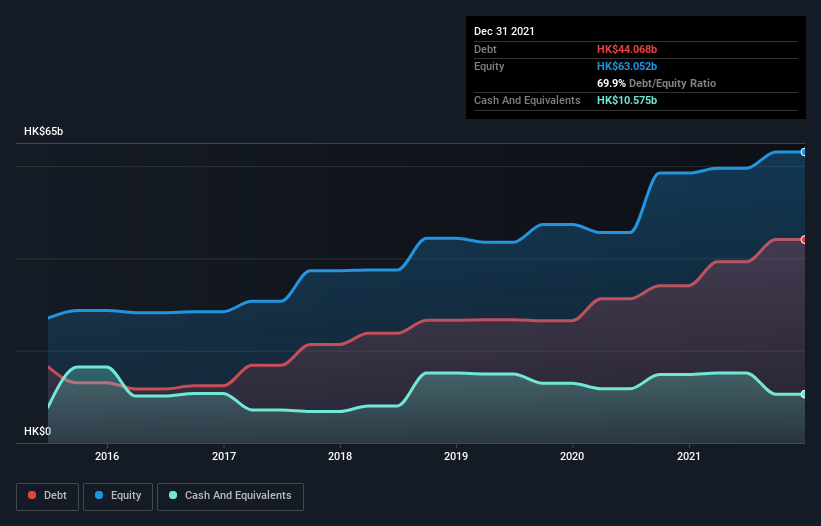- Hong Kong
- /
- Infrastructure
- /
- SEHK:152
Here's Why Shenzhen International Holdings (HKG:152) Is Weighed Down By Its Debt Load

David Iben put it well when he said, 'Volatility is not a risk we care about. What we care about is avoiding the permanent loss of capital.' When we think about how risky a company is, we always like to look at its use of debt, since debt overload can lead to ruin. Importantly, Shenzhen International Holdings Limited (HKG:152) does carry debt. But should shareholders be worried about its use of debt?
When Is Debt Dangerous?
Debt is a tool to help businesses grow, but if a business is incapable of paying off its lenders, then it exists at their mercy. If things get really bad, the lenders can take control of the business. However, a more usual (but still expensive) situation is where a company must dilute shareholders at a cheap share price simply to get debt under control. Of course, plenty of companies use debt to fund growth, without any negative consequences. The first step when considering a company's debt levels is to consider its cash and debt together.
See our latest analysis for Shenzhen International Holdings
How Much Debt Does Shenzhen International Holdings Carry?
The image below, which you can click on for greater detail, shows that at December 2021 Shenzhen International Holdings had debt of HK$44.1b, up from HK$34.1b in one year. However, it does have HK$10.6b in cash offsetting this, leading to net debt of about HK$33.5b.

How Strong Is Shenzhen International Holdings' Balance Sheet?
Zooming in on the latest balance sheet data, we can see that Shenzhen International Holdings had liabilities of HK$29.0b due within 12 months and liabilities of HK$31.7b due beyond that. Offsetting these obligations, it had cash of HK$10.6b as well as receivables valued at HK$5.69b due within 12 months. So it has liabilities totalling HK$44.4b more than its cash and near-term receivables, combined.
This deficit casts a shadow over the HK$18.7b company, like a colossus towering over mere mortals. So we definitely think shareholders need to watch this one closely. At the end of the day, Shenzhen International Holdings would probably need a major re-capitalization if its creditors were to demand repayment.
We measure a company's debt load relative to its earnings power by looking at its net debt divided by its earnings before interest, tax, depreciation, and amortization (EBITDA) and by calculating how easily its earnings before interest and tax (EBIT) cover its interest expense (interest cover). Thus we consider debt relative to earnings both with and without depreciation and amortization expenses.
Shenzhen International Holdings's debt is 4.8 times its EBITDA, and its EBIT cover its interest expense 5.0 times over. Taken together this implies that, while we wouldn't want to see debt levels rise, we think it can handle its current leverage. Importantly, Shenzhen International Holdings's EBIT fell a jaw-dropping 21% in the last twelve months. If that decline continues then paying off debt will be harder than selling foie gras at a vegan convention. When analysing debt levels, the balance sheet is the obvious place to start. But ultimately the future profitability of the business will decide if Shenzhen International Holdings can strengthen its balance sheet over time. So if you want to see what the professionals think, you might find this free report on analyst profit forecasts to be interesting.
Finally, a business needs free cash flow to pay off debt; accounting profits just don't cut it. So it's worth checking how much of that EBIT is backed by free cash flow. Over the last three years, Shenzhen International Holdings saw substantial negative free cash flow, in total. While investors are no doubt expecting a reversal of that situation in due course, it clearly does mean its use of debt is more risky.
Our View
On the face of it, Shenzhen International Holdings's EBIT growth rate left us tentative about the stock, and its level of total liabilities was no more enticing than the one empty restaurant on the busiest night of the year. But at least its interest cover is not so bad. We should also note that Infrastructure industry companies like Shenzhen International Holdings commonly do use debt without problems. Considering all the factors previously mentioned, we think that Shenzhen International Holdings really is carrying too much debt. To our minds, that means the stock is rather high risk, and probably one to avoid; but to each their own (investing) style. When analysing debt levels, the balance sheet is the obvious place to start. But ultimately, every company can contain risks that exist outside of the balance sheet. Be aware that Shenzhen International Holdings is showing 4 warning signs in our investment analysis , and 1 of those makes us a bit uncomfortable...
When all is said and done, sometimes its easier to focus on companies that don't even need debt. Readers can access a list of growth stocks with zero net debt 100% free, right now.
If you're looking to trade Shenzhen International Holdings, open an account with the lowest-cost platform trusted by professionals, Interactive Brokers.
With clients in over 200 countries and territories, and access to 160 markets, IBKR lets you trade stocks, options, futures, forex, bonds and funds from a single integrated account.
Enjoy no hidden fees, no account minimums, and FX conversion rates as low as 0.03%, far better than what most brokers offer.
Sponsored ContentNew: Manage All Your Stock Portfolios in One Place
We've created the ultimate portfolio companion for stock investors, and it's free.
• Connect an unlimited number of Portfolios and see your total in one currency
• Be alerted to new Warning Signs or Risks via email or mobile
• Track the Fair Value of your stocks
Have feedback on this article? Concerned about the content? Get in touch with us directly. Alternatively, email editorial-team (at) simplywallst.com.
This article by Simply Wall St is general in nature. We provide commentary based on historical data and analyst forecasts only using an unbiased methodology and our articles are not intended to be financial advice. It does not constitute a recommendation to buy or sell any stock, and does not take account of your objectives, or your financial situation. We aim to bring you long-term focused analysis driven by fundamental data. Note that our analysis may not factor in the latest price-sensitive company announcements or qualitative material. Simply Wall St has no position in any stocks mentioned.
About SEHK:152
Shenzhen International Holdings
An investment holding company, invests in, constructs, and operates logistics infrastructure facilities primarily in the People’s Republic of China.
Good value with proven track record.
Market Insights
Community Narratives



